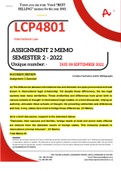Tutors you can trust. Voted “BEST
SELLING” memos for the year 2021.
LCP4801
International Law
ASSIGNMENT 2 MEMO
SEMESTER 2 - 2022
Unique number: - DUE: 08 SEPTEMBER 2022
DOCUMENT PREVIEW
Includes Footnotes and/or Bibliography
Assignment 2 Question
(a) The differences between international law and domestic are quite pronounced and well
known in international legal scholarship. Yet despite these differences, the two legal
systems bear many similarities. These similarities and differences have given birth to
various schools of thought in international legal studies. In a brief discussion, relying on
authority, articulate these schools of thought, the prevailing similarities and differences
and how, if any, states have tried to bridge those differences. (15 Marks)
(b) In a brief discussion, respond to the statement below:
“Diplomats, their spouses and families, foreign heads of state and senior state officials
are immune from the domestic courts of foreign states. This immunity extends to
international criminal tribunals”. (10 Marks)
Total Marks 25
Disclaimer
Extreme care has been used by our Tutors to draft this document, however the contents are provided “as is” without any representations
or warranties, express or implied. This document is to be used for comparison, research and reference purposes ONLY. No part of this
document may be reproduced, resold or transmitted in any form or by any means without prior written permission from the Author. –
LLB EXAMPACKS & TUTORIALS.
PAST PAPERS & MEMOS, ASSIGNMENT MEMOS, NOTES, SUMMARIES & TUITONS.
Cell: 084 591 8661 Email: llbexampacks@gmail.com
Fax: 086 096 5452 www.llbexampacksandtutorials.co.za
, Assignment 2 Questions
(a) The differences between international law and domestic are quite
pronounced and well known in international legal scholarship. Yet despite these
differences, the two legal systems bear many similarities. These similarities and
differences have given birth to various schools of thought in international legal
studies. In a brief discussion, relying on authority, articulate these schools of
thought, the prevailing similarities and differences and how, if any, states have
tried to bridge those differences. (15 Marks)
(b) In a brief discussion, respond to the statement below:
“Diplomats, their spouses and families, foreign heads of state and senior state
officials are immune from the domestic courts of foreign states. This immunity
extends to international criminal tribunals”. (10 Marks)
Total Marks 25
ANSWERS
A)
National(domestic) law operates within the territory of one state, governs the
relationships between its subjects (on the one hand), and the relationship between
those subjects and the state on the other hand. The rules of national law are binding
on each and every subject within the territory of that state. Depending on the nature of
the legal system, these binding legal rules are developed by the courts or promulgated
in legislative codes by a body authorised to do so (or a combination of the two).
International law consists of rules governing the relationship between states. These
rules are created mostly by consent. In other words states are bound by them because
they have agreed to be so bound: They choose to enter into treaties or to follow a
particular practice that could develop into a rule of customary international law. Thus,
unlike national law, international law knows no central legislator and no executive
authority.




